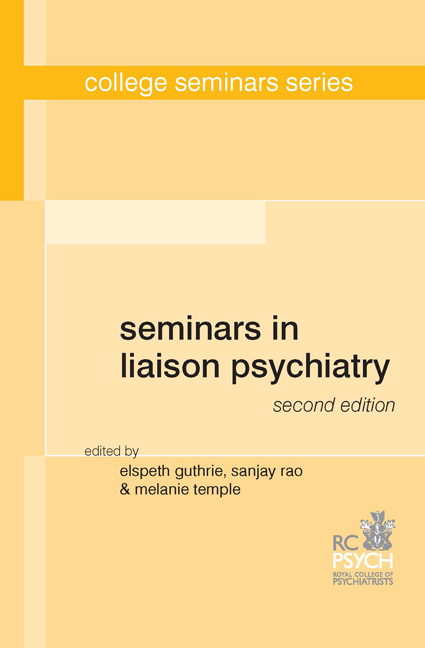Book contents
- Frontmatter
- Contents
- Abbreviations
- List of boxes, tables and figures
- List of contributors
- 1 Basic skills and competencies in liaison psychiatry
- 2 The liaison psychiatry curriculum
- 3 Classification and diagnosis
- 4 Capacity and consent
- 5 Psychological reaction to physical illness
- 6 Medically unexplained symptoms
- 7 Alcohol and substance use in the general hospital
- 8 Accident and emergency psychiatry and self-harm
- 9 Perinatal psychiatry
- 10 General medicine and its specialties
- 11 Liaison psychiatry and surgery
- 12 Neuropsychiatry for liaison psychiatrists
- 13 Psycho-oncology
- 14 Palliative care psychiatry
- 15 Sleep disorders
- 16 Weight- and eating-related issues in liaison psychiatry
- 17 Disaster management
- 18 Liaison psychiatry and older people
- 19 Paediatric liaison psychiatry
- 20 Primary care and management of long-term conditions
- 21 Occupational medicine
- 22 HIV and liaison psychiatry
- 23 Sexual dysfunction
- 24 Psychopharmacology in the medically ill
- 25 Psychological treatments in liaison psychiatry
- 26 Research, audit and rating scales
- 27 Service models
- 28 Developing liaison psychiatry services
- 29 Multiple choice questions and extended matching items
- Appendix 1 Specific competencies
- Appendix 2 Learning objectives with assessment guidance
- Index
22 - HIV and liaison psychiatry
- Frontmatter
- Contents
- Abbreviations
- List of boxes, tables and figures
- List of contributors
- 1 Basic skills and competencies in liaison psychiatry
- 2 The liaison psychiatry curriculum
- 3 Classification and diagnosis
- 4 Capacity and consent
- 5 Psychological reaction to physical illness
- 6 Medically unexplained symptoms
- 7 Alcohol and substance use in the general hospital
- 8 Accident and emergency psychiatry and self-harm
- 9 Perinatal psychiatry
- 10 General medicine and its specialties
- 11 Liaison psychiatry and surgery
- 12 Neuropsychiatry for liaison psychiatrists
- 13 Psycho-oncology
- 14 Palliative care psychiatry
- 15 Sleep disorders
- 16 Weight- and eating-related issues in liaison psychiatry
- 17 Disaster management
- 18 Liaison psychiatry and older people
- 19 Paediatric liaison psychiatry
- 20 Primary care and management of long-term conditions
- 21 Occupational medicine
- 22 HIV and liaison psychiatry
- 23 Sexual dysfunction
- 24 Psychopharmacology in the medically ill
- 25 Psychological treatments in liaison psychiatry
- 26 Research, audit and rating scales
- 27 Service models
- 28 Developing liaison psychiatry services
- 29 Multiple choice questions and extended matching items
- Appendix 1 Specific competencies
- Appendix 2 Learning objectives with assessment guidance
- Index
Summary
More than 20 million people have died of AIDS since disease identification in 1981 and an estimated 35 million people worldwide now live with HIV/ AIDS; 95% of those infected live in low- and middle-income countries, with Sub-Saharan Africa being the region most heavily affected. Globally, half of those infected are women. Of the 35 million people infected worldwide, around 2 million are children under the age of 15 (UNAIDS, 2008). The psychiatric complications of HIV seen in children are, however, beyond the scope of this chapter.
In the UK, HIV prevalence is steadily increasing – an estimated 83 000 individuals had HIV at the end of 2008 (Health Protection Agency UK, 2008). A quarter of those infected are unaware of the infection. Although the majority of people with HIV in the UK are men, new diagnoses among heterosexuals now exceed new diagnoses among gay men and, in comparison to 1996 levels, there has been a fivefold increase in the diagnosis among women (Health Protection Agency UK, 2008).
Over time, with preventative public health campaigns, the demography of the epidemic in high-income countries is changing. There is now a smaller representation of the stereotypical gay man in his 30s or 40s. There are increasing numbers of young gay men whose acquisition of the virus is often associated with substance misuse, increasing numbers of heterosexuals, especially among immigrants from countries with high prevalence rates, and increasing numbers of people with mental illness and HIV (McKinnon et al, 2002). Where needle exchange programmes exist, declining numbers of intravenous drug users with HIV are seen. Medically acquired HIV is now rare in high-income countries.
Where modern antiretroviral treatments and routine antimicrobial prophylaxis are available, the issues confronting the patient with HIV and those who care for them have changed from the early days of the epidemic. Morbidity and mortality rates have dramatically fallen. Opportunistic infections are less common and many are comparatively well (Panther & Libman, 2005). The numbers of patients in their 50s and 60s is increasing and of these many have been living with the disease for more than 20 years (Brew et al, 2009).
- Type
- Chapter
- Information
- Seminars in Liaison Psychiatry , pp. 330 - 344Publisher: Royal College of PsychiatristsFirst published in: 2017



